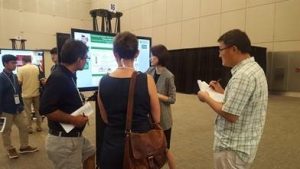by Xuechun Bai
Austin, Texas, is a fantastic place for passionate ASAS and CASA members to feel the heat of summer and devote themselves to research and industry work of animal science. I feel so lucky to have been able to attend such a great conference, meet a great roster of speakers, take part in their research communication, and question a panel of experts. A big Thank You to Livestock Gentec and Dr. Graham Plastow for sending me and granting me a CSAS Graduate Student Travel Award.
There were too many amazing moments and symposia discussing hot topics and advanced research in animal science to share them all here, so be sure to check out all the event materials through the Meeting App.
Dr. Ignacy Misztal (University of Georgia) opened the Breeding and Genetics symposium with a keynote on the current status of genomic selection that has been dramatically simplified by the development of new methodologies, such as ssGBLUP—single-step genomic best linear unbiased prediction. Dr. Tom Lawlor (US Holstein Association), Dr. Egbert Knol (Topigs Norsvin Research Center) and Dr. Dan Moser (Angus Genetics Inc.) gave great talks about the tremendous impact of genomic selection on dairy, swine, and beef industries, respectively, including current achievements, challenges and future directions. Sessions about animal breeding and genetics broached the central question of how genomic selection has changed livestock breeding. Dr. Makram Geha (Corteva Agriscience) shared his research experience on genomic selection and gene editing in plant breeding, which allow us to broaden our horizons and learn advanced methodologies developed in plant science. Dr. Jack Dekkers (Iowa State University) provided an excellent summary of the meeting with an outlook of the future of increasing genetic gain and precision livestock breeding through machine learning, deep learning, and the development of breeding technologies.
The primary topic of the WAAP-CSAS symposium was improving the efficiency of livestock production. Dr. Graham Plastow gave a very inspiring talk about the role of genomics in enhancing efficiency in swine by addressing social and environmental aspects (such as disease and stress), to improve the sustainability of swine production.
Genome editing via CRISPR-Cas was another popular topic that sparked heated discussion. Dr. Kristin Whitworth (University of Missouri) presented exciting results of creating pigs that are fully resistant to PRRSV (porcine reproductive and respiratory syndrome virus) and TEGV (transmissible gastroenteritis virus) through genome editing. (However, they did not succeed with PEDV.**) Accordingly, talks focused on the global regulatory landscape for evaluation of products derived from gene editing and earning public trust in gene editing, which could help researchers, regulators, governments, and consumers to build better communications strategies on the development and application of this technique.
Other breeding and genetics sessions covered many different and exciting topics, such as the use of APY (Algorithm for Proven and Young) in many studies of genomic selection at the University of Georgia; the integration of microbiome information into the studies of meat quality, carcass composition traits, and host responses to PRRSV in swine.
As well, many sessions on animal nutrition, animal behaviour and welfare, animal health and companion animals were available. Taken together, they gave us new insights into animal science, current science and the next steps.
Last but not least, attending was an excellent opportunity to communicate with people from academia and industry, and to receive feedback and constructive criticism on my research during my poster presentation. It was also a great chance to network, share thoughts, and expand my knowledge with other academics and experts.

** See also the accompanying article (link above) by Julie Keenliside on PEDV in Alberta in 2019. Gentec also drew something of a blank in our initial work on genomics and PEDV suscpetibility.
